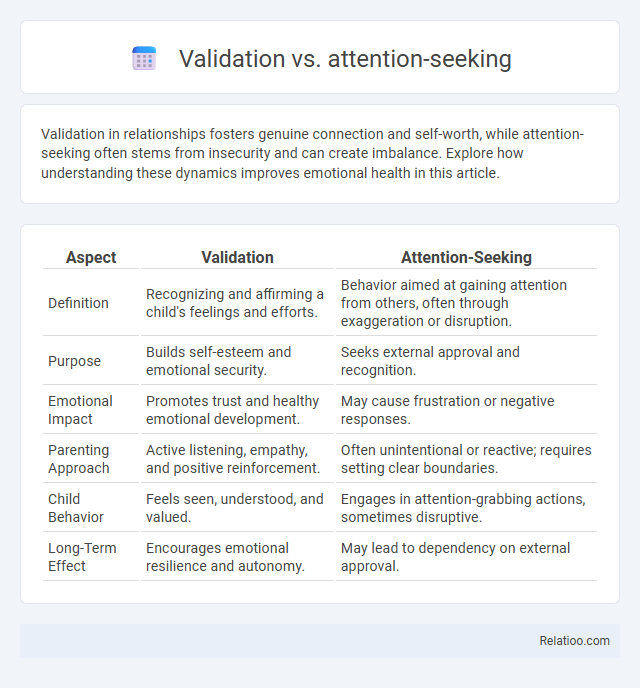Validation in relationships fosters genuine connection and self-worth, while attention-seeking often stems from insecurity and can create imbalance. Explore how understanding these dynamics improves emotional health in this article.
Table of Comparison
| Aspect | Validation | Attention-Seeking |
|---|---|---|
| Definition | Recognizing and affirming a child's feelings and efforts. | Behavior aimed at gaining attention from others, often through exaggeration or disruption. |
| Purpose | Builds self-esteem and emotional security. | Seeks external approval and recognition. |
| Emotional Impact | Promotes trust and healthy emotional development. | May cause frustration or negative responses. |
| Parenting Approach | Active listening, empathy, and positive reinforcement. | Often unintentional or reactive; requires setting clear boundaries. |
| Child Behavior | Feels seen, understood, and valued. | Engages in attention-grabbing actions, sometimes disruptive. |
| Long-Term Effect | Encourages emotional resilience and autonomy. | May lead to dependency on external approval. |
Understanding Validation and Attention-Seeking
Understanding validation involves recognizing the genuine need for acknowledgment of one's feelings or achievements, which fosters self-esteem and healthy relationships. Attention-seeking behavior, by contrast, often reflects a desire for external approval that may manifest as exaggerated actions or emotional displays, potentially disrupting social harmony. Validation seeking bridges these concepts, as it refers to the active pursuit of affirmation, which when balanced, supports emotional well-being but can become problematic if it relies excessively on others' approval.
The Psychology Behind Validation
Validation is the psychological process of confirming one's feelings or beliefs, providing a sense of self-worth and emotional security. Attention-seeking involves displaying behaviors aimed at attracting notice and approval from others, often driven by unmet emotional needs. Validation seeking specifically refers to the desire for external affirmation to reinforce one's self-concept, which can impact Your emotional well-being by influencing self-esteem and interpersonal relationships.
What Drives Attention-Seeking Behavior?
Attention-seeking behavior is driven primarily by an individual's desire for social recognition, affirmation, and emotional support, often rooted in unmet psychological needs such as low self-esteem or insecurity. Unlike healthy validation, which involves seeking genuine understanding and acceptance, attention-seeking tends to manifest through exaggerated or disruptive actions aimed at capturing immediate focus from others. Neuropsychological studies link this behavior to dopamine reward pathways, where the anticipation of social approval activates pleasure centers in the brain, reinforcing the cycle of attention-seeking.
Key Differences: Validation vs. Attention-Seeking
Validation involves seeking affirmation to confirm personal feelings or beliefs through genuine acknowledgment from others, fostering self-confidence and emotional growth. Attention-seeking focuses on drawing others' notice primarily to fulfill ego-driven desires, often through exaggerated or disruptive behaviors without seeking genuine understanding or feedback. Validation seeking is more about obtaining constructive and supportive responses, whereas attention-seeking typically aims at immediate visibility regardless of the quality or sincerity of engagement.
Signs of Healthy Validation
Signs of healthy validation include expressing needs clearly without relying excessively on others' approval or attention. It involves seeking genuine feedback to support personal growth rather than constant reassurance, distinguishing it from attention-seeking behaviors. Healthy validation fosters self-awareness and confidence, promoting balanced emotional connections.
Recognizing Attention-Seeking Patterns
Recognizing attention-seeking patterns involves identifying behaviors aimed primarily at eliciting external approval or recognition, often characterized by exaggerated expressions or frequent calls for acknowledgment. Validation differs as it centers on seeking affirmation for one's thoughts or feelings to reinforce self-worth, while validation seeking specifically targets reassurance to confirm personal beliefs or emotional states. Distinguishing these behaviors requires observing motivations behind actions, noting whether the goal is acceptance through empathy or merely to attract notice without deeper emotional engagement.
The Impact on Relationships
Validation strengthens relationships by fostering trust and emotional security, while attention-seeking can create imbalance and frustration, often leading to conflict. Validation seeking, when excessive, may strain connections by causing dependency and reduced authentic communication. Healthy interactions rely on mutual recognition and genuine support rather than superficial approval or constant attention.
Benefits of Genuine Validation
Genuine validation fosters authentic self-esteem by acknowledging personal experiences and emotions without dependency on external approval. It strengthens mental health by promoting inner confidence and resilience, reducing anxiety linked to attention-seeking behaviors. Unlike attention-seeking or validation seeking, genuine validation encourages meaningful social connections that support emotional well-being.
Overcoming Attention-Seeking Habits
Overcoming attention-seeking habits requires shifting focus from external validation to internal self-worth, emphasizing self-validation through mindful self-reflection and emotional awareness. Developing resilience involves recognizing attention-seeking behaviors as coping mechanisms and replacing them with healthier communication and authentic self-expression. Consistent practice of self-compassion and setting personal boundaries enhances emotional stability, reducing reliance on external approval for self-esteem.
Fostering Authentic Connections
Fostering authentic connections requires understanding the difference between validation, attention-seeking, and validation seeking. Validation involves recognizing and affirming someone's genuine feelings or experiences, while attention-seeking behaviors often stem from a desire to gain superficial acknowledgment without emotional depth. Validation seeking lies in the middle, where individuals desire genuine affirmation but may struggle to express or receive it healthily, making authentic communication essential to building trust and meaningful relationships.

Infographic: validation vs attention-seeking
 relatioo.com
relatioo.com